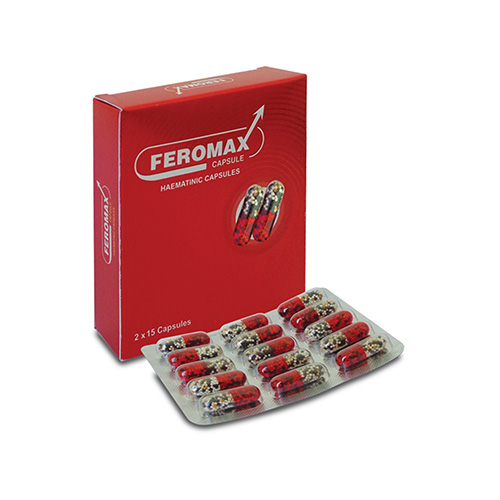
FEROMAX Capsule
Therapeutic Class
Haematinic capsules for anaemia & general well-being.
Indications
The primary indication for this haematinic combination is iron deficiency anemia. In general, the product is recommended for treatment of all anemias responsive to oral iron therapy, such as hypochromic anemia associated with malabsorption, chronic or acute blood loss, dietary restriction, disease and post surgical convalescence. In pregnancy, where the fetus takes up to 600 mg of iron from the mother, even if she is iron deficient. Since many studies have demonstrated that deprivation of metals such as Copper, Manganese and Zinc result in hemotopiesis abnormalities, the product supplies these metals along with iron. For the treatment of all anemias responsive to oral iron therapy, such as hypochromic anemia associated with pregnancy, chronic or acute blood loss, dietary restriction, metabolic diseases and post surgical convalescence.
Chemical Composition
Each capsule contains:
Carbonyl Iron equivalent to
Elemental Iron : 100 mg
Zinc Sulphate Monohydrate USP: 61.8 mg
(equiv. to 22.5 mg of elemental zinc)
Folic Acid BP - 1 mg
Excipients : Q.S.
Packaging
2 x 15's Capsules
Dosage & Administration
Rarely, iron in therapeutic doses produces gastrointestinal reactions, such as diarrhea or constipation. Reducing the dose and administering it with meals will minimize these effects in the iron-sensitive patient. In extremely rare instances, skin rash suggesting allergy has been noted following the oral administration of liver-stomach material. Allergic sensitization has been reported following both oral and parenteral administration of folic acid.
Contraindications
Hemochromatosis and hemosiderosis are contraindications to iron therapy.
Warning & Precautions
Accidental overdose of iron-containing products is a leading cause of fatal poisoning in children under age 6. Keep this product out of the reach of children. In case of accidental overdose, call a doctor.
Side Effects
Rarely, iron in therapeutic doses produces gastrointestinal reactions, such as diarrhea or constipation. Reducing the dose and administering it with meals will minimize these effects in the iron-sensitive patient. In extremely rare instances, skin rash suggesting allergy has been noted following the oral administration of liver-stomach material. Allergic sensitization has been reported following both oral and parenteral administration of folic acid.
Drug Interaction
Concurrent administration may reduce the efficacy of Fluoroquinolones, Levodopa, Carbidopa, Thyroxine and Bisphosphonates. Iron may reduce the absorption of penicillamine by forming complexes. Concurrent administration with tetracycline may lead to reduced absorption of Tetracycline and iron. Antacids may reduce the absorption of iron. Serum levels of anticonvulsants may be reduced by folic acid.

